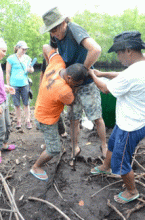Peter Lape: Eastern Indonesia
Dr. Peter Lape, accompanied by archaeology graduate students Jenn Huff, Joss Whittaker, and Lauryl Zenobi, and recent PhD Emily Peterson, spent October and November 2015 on an archaeological field survey project on Seram Island and small offshore islets in eastern Indonesia. This collaboration between UW Anthropology and the Indonesian National Archaeology Research Center, is a multi-year project to investigate links between the emergence of agriculture, climate change, and coral reef productivity on both large and small tropical islands. Funded by National Geographic, Mellon Foundation, and the UW’s Quaternary Research Center, their 22-person US-Indonesian team discovered three new Neolithic era (3500 years old) sites, and a number of other sites dating to about 1200 years ago, and a new cliff side rock art site. They also collected sediment cores from two different mangrove swamps to be analyzed by Dr. Julian Sachs from UW Oceanography in order to help them reconstruct and understand the changing rainfall patterns over the past 3500 years. Dr. Lape and his team plan to return in spring 2017 to excavate at the cave sites and continue their survey work.
Photo caption: Collecting sediment cores from the Airnanang mangrove swamp, Seram Island, Indonesia. (l-r) Lauryl Zenobi, Emily Peterson, Michael Lahallo, Joss Whittaker, Simon Latupapua
Michael Pérez: Jordan
Professor Michael Pérez runs a popular two-month summer study abroad program in Amman, Jordan. This program provides students with an immersive experience in which they can reflect on key themes of contemporary modernity—neoliberalism, religion, politics—and examine their own ideas about the region in the process. The Middle East is a particularly important region today for North Americans. It is an area where the US military is deeply involved and one that regularly appears in the media and in popular culture. The constant exposure to the region in our political cultural landscape has not, however, translated into nuanced understandings of the peoples, places, and histories that make up the Middle East.
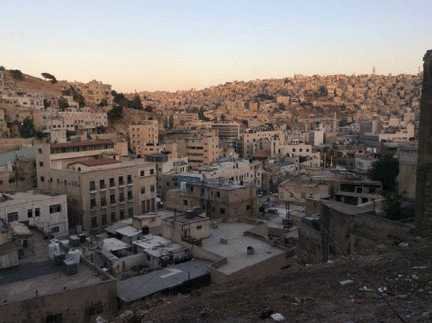
The study abroad program involves a 12-credit seminar on the Anthropology of the Middle East; a course in colloquial Arabic; excursions to historic sites such as Petra and Wadi Rum; and visits to cultural centers and institutions focused on contemporary issues in the country, including the United Nations Relief and Works Agency refugee camps in Amman. Pérez conducted his field work at these camps, and uses his research in teaching students about the Palestinian population of Jordan who, although refugees, comprise about half of the Jordanian population. The program offers students a unique chance for students to learn from an expert in the region, through an immersive and academic experience.
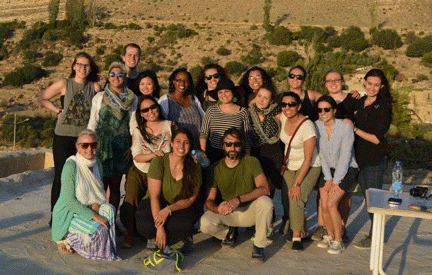
Holly Barker: French Polynesia
For the past three summers, Holly Barker has led a study abroad to French Polynesia. The inspiration for the trip came from a Polynesian football player at the UW who lamented his inability to participate in the same kinds of transformational educational opportunities as other students because of his athletic commitments. By including Seattle-based service learning as part of the study abroad credit, and coordinating schedules for student-athletes with colleagues at Student-Athlete Academic Services (SAAS) at the UW, Holly and the SAAS academic counselors who join the trip (Ink Aleaga and Liberty Bracken) found a window of summer travel that would not impede athletic schedules. By partnering with SAAS and talking with students and coaches about their needs, more students at UW have an opportunity to participate in study abroad, and to gain a firsthand understanding of indigenous research methods in Oceania.
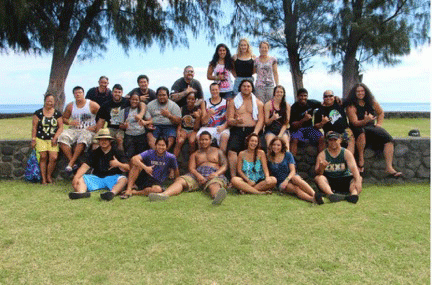
Photo Caption: Holly Barker with students in French Polynesia
Sara Gonzalez: Grand Ronde Reservation
Assistant Professor Sara Gonzalez, received a UW Royalty Research Fund grant to support her community-based research partnership with the Confederated Tribes of Grand Ronde Community of Oregon’s Tribal Historic Preservation Office (THPO). In their first season, they created Field Methods in Indigenous Archaeology to build the capacity of the THPO to manage and record historic properties on the Grand Ronde reservation in northwestern Oregon. They brought UW undergraduates and Grand Ronde tribal members to train them in the methods of tribal historic preservation, archaeology, and community-based research. They are starting their second season and are now accepting applications for the 2016 field school, which can be accessed at: http://goo.gl/forms/WBrWnnHjWx.
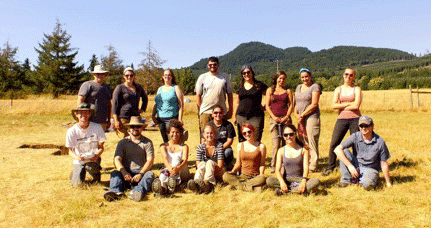
Photo Caption: Sara Gonzales with UW undergraduates and Tribal members from Grand Ronde
Ann Anagnost: Italy
Last November, seventeen UW students accompanied Anthropology Professor Ann Anagnost to Italy for a study abroad program focused on food politics and culture. The program started in Milan where the students lived on an ethical farm on the outskirts of the city while attending events organized by the Slow Food Youth Movement and touring the Milan Expo, which focused on the theme “We Feed the World.” After a week in Milan, the program continued at the University of Washington’s Rome Center in the historic heart of the city. One of the highlights of the quarter was an unexpected opportunity to work as volunteer cooks for Baobab, a self-organized refugee settlement located near Tiburtina Station northeast of the city center. Baobab is run by an informal network of volunteers from Rome to provide refugee needs unmet by government efforts. The students cooked Ethiopian lasagne, minestrone,and pasta puttanesca (pasta with tuna and olives) for a group including many small children mostly from the Horn of Africa who had just arrived by boat over stormy seas. They arrived exhausted and hungry having had only ten days’ worth of food on a fourteen-day voyage.

Photo Caption: Welcome sign at Baobab refugee center. Photo credit: Robert Smith
The experience brought home for everyone the dire situation of the refugees flowing into Europe from conflict and climate change. The study abroad program in Rome has been offered every Autumn Quarter since 2011 and planning is underway for 2016.
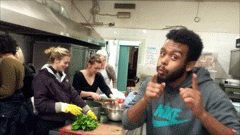
Photo Caption: UW students (left to right) Maggie Rickman, Elizabeth Rodland, Courtney Roller, and Meraf Geberehiwot. Professor Anagnost is second right. Photo credit: Robert Smith
Ben Marwick
Ben Marwick received funding from the Australian Research Council for a project investigating the first modern humans in mainland Southeast Asia. With colleagues from the University of Wollongong, he has been directing archaeological excavations in Myanmar and Vietnam, including a field school for UW students in Vietnam.
https://www.facebook.com/groups/467297763435177/photos/
Marcos Llobera
Marcos has been leading, together with UW graduate student Jake Deppen, and local archaeologists a landscape archaeology project in the region of Son Servera (Mallorca, Spain). The project (Landscape, Encounters and Identity Project: leiap.weebly.com) aims at reconstructing the landscape history of this region which is rich in archaeological evidence for multiple periods (e.g. Late Bronze and Iron Age, Roman, Byzantine, Islamic). In addition, the project also serves as a field school involving UW and international students in excavation and intensive survey.
http://leiap.weebly.com/uw-study-abroad.html
Ben Fitzhugh
Dr. Ben Fitzhugh, UW PhDs Erik Gjesfjeld and Jennie Deo Shaw, current UW PhD candidate Will Brown, and international collaborator Mark Hudson—published a paper presenting evidence for major population fluctuations over the past 4000 years in the settlement history of the remote Kuril Islands, northeast of Japan in the journal Quaternary International. The presentation includes new statistical modeling protocols and engages ongoing debates in archaeological paleodemographic methods. The paper goes on to explore a number of possible causes for population failure in the Kurils including climate driven ecological collapse, emergent political economic dependencies tied to expanding East Asian trade markets, and epidemic diseasesThis work is the outcome of a multi-year, interdisciplinary, NSF funded field project in the Kurils. In the past two years, the Kuril research has led Fitzhugh and colleagues to organize the Paleoecology of Subarctic Seas (PESAS) working group. This international, interdisciplinary research coordination effort seeks to compare human-environmental dynamics around the subarctic North Pacific and the North Atlantic.
Dr. Ben Fitzhugh is involved with Arctic research groups seeking to preserve and recover vulnerable archaeological and paleoecological data sets from a thawing Arctic for their cultural heritage and scientific value.
Fitzhugh continues to direct the UW Quaternary Research Center for the past two years and is pleased to see more archaeological participation and research featured in QRC during this time.
